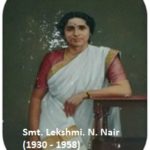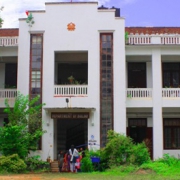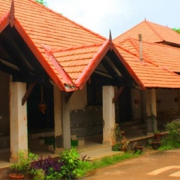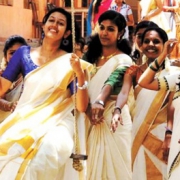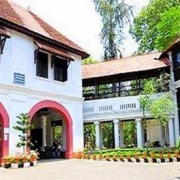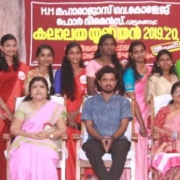Department of Music
The Department of Music was established in 1929 and commenced offering an intermediate course the same year headed by Smt. Lekshmi.N.Nair. The Department in 1950 creates history by offeringgraduate degree (Bachelor of Arts) in music for the first time in Kerala. The Department launched the postgraduate degree (Master of Arts) in 1968, the first of its kind in Kerala. It was the first PG course offered by the Government College for Women. Furthermore the department went on to be recognized as a Research Centre in 1987.
With a history spanning several millennia, Indian music encompasses multiple genres, each of which have their uniqueness attributed to it. The history of Indian music can be traced back to the Vedic times wherein music was considered to be a part of rituals being rooted deeply in traditional philosophical concepts and religious beliefs. Of the two streams of music in the world Indian music predominantly deals with the melodic design. Indian music finds its strength in the raga system which is the majestic foundation upon which the discipline further developed. Ever since the bifurcation into Hindusthani and Carnatic music, both vocal and instrumental music has become highly developed over the centuries and a rich heritage has emerged that is unparalleled. With the advent of advanced technology and inter-disciplinary study the pedagogybrought with it more innovative learning practices that has become relevant in the field of music today. This has led to innovative research streams and the music industry as such has been thriving creating more opportunities and avenues for the students to pursue as a profession.
At the Department of Music, students are taught Carnatic vocal music along with the traditional instrument Veena and the theoretical concepts that are needed to hone a musician. Sanskrit is also offered as a subsidiary subject since it is imperative that a Carnatic musician understand the nuances of the language. The department provides a comprehensive course in both its graduate and postgraduate programmes combining with it the modern inter-disciplinary facets of the subject as well. While Veena and Sanskrit are complimentary subjects, other topics like Informatics, Hindusthani Music, Western Music and Music and Allied Disciplines are included in the syllabus to name a few.
PROGRAMMES OFFERED
| Name of the Programme | Main Subject | Category | Duration | Eligibility |
| BA | Music (Vocal) | UG (Arts) | 6 Semesters (3 yrs.) | Apart from the basic pass requisite in Plus 2, admission is also subject to an aptitude test wherein the students’ tonal quality and sense of music is evaluated. |
| MA | Music (Vocal) | PG (Arts) | 4 Semesters (2 yrs.) | Should have completed graduation in music with the required pass percentage. |
| PhD | Music (Vocal) | PhD | Full Time – 3 yrs.
Part Time – 5 yrs. |
NET-JRF or completed M.Philin Music. The research department caters to both full-time and part-time PhD programmes. |
| Sl.
No. |
Class | Total number of students | Total number of teachers | Student Teacher Ratio |
| 1 | UG | 34 | 3 | 11:1 |
| 2 | PG | 14 | 5 | 3:1 |
| 3 | Overall | 49 | 8 | 6:1 |
BEST PRACTICES
- Study groups are formed for Veena Practical sessions to encourage skilled learning among peers of varying calibre.
- Encourage topic based discussions in class and ask the students to research and prepare short summary based on the theory topics they learn. This enables them to be more familiar with the content they learn.
- Introduced social media engagement through an official Facebook page of the Department of Music, where students are asked to contribute in terms of musical presentations.
- SATATAM NAMAMI is a segment introduced through the official Facebook page wherein chosen students from each semester prepare an audio/video presentation on musical luminaries.
- Encourage them to base their practical learning on advanced listening to other artists and musicians
- Make sure they attend vocal enhancement sessions before their practical classes so as to strengthen their tonal quality through innovative voice gym.
- Music appreciation sessions are conducted wherein students are required to listen to different genres of music and communicate how they perceived it.
- Introduced theme based spot Mock Quizzes in class and via e-learning tools like Kahoot, so as to prepare them for VIVA later on in their examinations.
- Introduced ICT enabled learning environment. Interactive e-learning tools are used in Theory classes to make them more interactive and interesting.
- Students are encouraged to create collaborative music productions wherein they work together to record both audio and video by themselves and edit the presentation and do the music production as well. Later on the productions are released via the official Facebook page.

